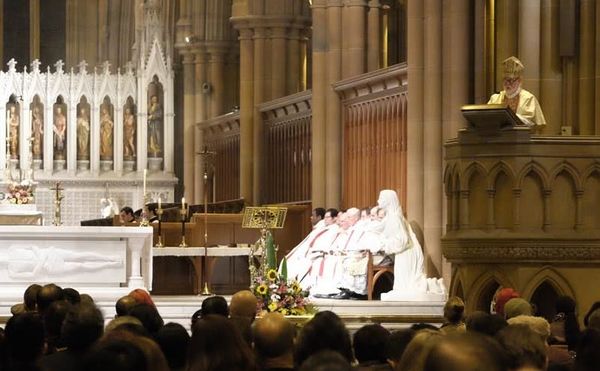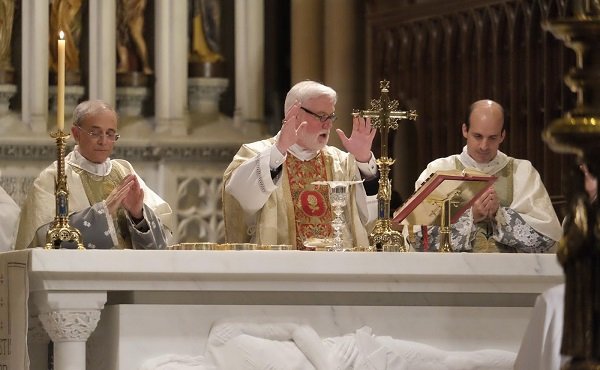Feast of Saint Josemaria Escriva de Balaguer
St Mary’s Cathedral, Sydney, 26 June 2014
Reverend Monsignor, Reverend Fathers, Brothers and Sisters in Christ,
It is with great pleasure that I greet you all this evening in the name of the Holy Father. I know that this is a day of great significance for all of you who take spiritual inspiration and nourishment from the revered example of Saint Josemaria Escriva de Balaguer. For many of you his life, ministry and teachings have been the providential instrument of bringing you to strong faith in Christ and persevering membership of the Church. In these times this is a great deal, and this evening through the celebration of this Holy Mass we must give thanks to God, our Father, for this.
The last time I gathered with many of you in this fine Cathedral was for the funeral of Father Amin Abboud. His premature death was a great blow to us all, and once again I present you my condolences, and in particular to his family and friends. He would, no doubt, have us renew our faith in God’s salvific design for “the Lord giveth and the Lord taketh away; blessed be the name of the Lord!”
On the 27 September next, Monsignor Alvaro Del Portillo, who was the first Prelate of Opus Dei, will be beatified in Spain; I imagine that many of you will be present. This too will be a source of encouragement for you.
Meanwhile, on 27 April last, I was fortunate to be able to attend the canonization of Pope John XXIII and Pope John Paul II, to the latter Opus Dei owes a great debt of gratitude and I am sure that you will be fervent in thanksgiving and in seeking the intercession of this great Saint. It was he who erected the Personal Prelature of the Holy Cross and Opus Dei, which, in my judgement, has allowed the charism of St Josemaria to be shared more widely within the Church, and for both clerical and lay members to offer greater witness and service within the whole Body of Christ, and for your evangelizing apostolate to have an ever wider impact throughout the world.
The Liturgy of the Word which we are celebrating offers some themes which are central to the spirituality of Opus Dei and the world view which is characteristic of the thinking of Saint Josemaria.
The foundations are laid before us in the reading from Genesis. This the second account of creation does not follow a succession of days, but rather speaks of a single time of creation. However, here too there is the repetition of: the Lord God made; the Lord God fashioned; the Lord God planted; the Lord God caused; the Lord God took. All that is, all being, all creation, is to be attributed to the Lord God; all is his work; all is Opus Dei.
But this work must be continued, even renewed, so that all may share in the spirit of thanksgiving. It is to man that creation is entrusted, so that it may be perfected. “All that is” is entrusted to us: we are to “take care of it”.
Our cooperation in this is not the work of the drone in the hive or the ant in its hill, but a work freely embraced, according to the teaching of St Paul, as his sons and heirs, who cry out “Abba, Father”, and who are aware of their dignity and responsibility as “children of God.”
Indeed, work is an essential part of the identity of the Lord and his disciples. Paul is the tent-maker from Tarsus and Jesus the carpenter from Nazareth, who when he goes looking for his first followers, chooses a hard-working community of fishermen in Galilee. Jesus clearly respects their profession. This is serious work. They are not fishing for pleasure with rod and line, as one might do on holiday on a charming stream dressed in waders and a fine akubra; all very civilized. No this has more to do with the characters out of the “Perfect Storm”, people who fish for their living, who risk their lives and whose livelihoods depend on what they catch.
Peter has already cooperated with Jesus in allowing him to use his boat as a floating pulpit; perhaps there had come to a financial arrangement of some kind, of which we do not know. What we do know is that Jesus, perhaps to reward Peter’s benevolence, says to him: “Put out into the deep water and pay out your nets for a catch”; this is rendered in Latin by the famous phrase “Duc in altum”; put out into the deep! Words cherished by St John Paul II in his homilies during the Great Jubilee of 2000, and adopted by numerous bishops appointed about that time!
Peter nets “a huge number of fish”. We may draw the conclusion: you have to fish in the right way and in the right place! Saint Josemaria understood this teaching of Jesus. You cannot expect to have an impact on a great number of people in a desert, no you build monasteries and hermitages in deserts. As a “fisher of men”, El Padre knew that it would be in cities, and within those cities in the universities and schools and numerous other kinds of institutions that the catch was to be made and would be the greatest.
It would be achieved through hard work inspired and sustained by the grace of good; it would advance the Kingdom of Our Lord Jesus Christ, and sanctify all those who committed their lives to this work. And with confidence we too this evening renew our willingness to “put out into the deep”; and we make holiness of life and integrity of spirit our great ambitions. Amen.
+ Paul Gallagher N.Ap.
